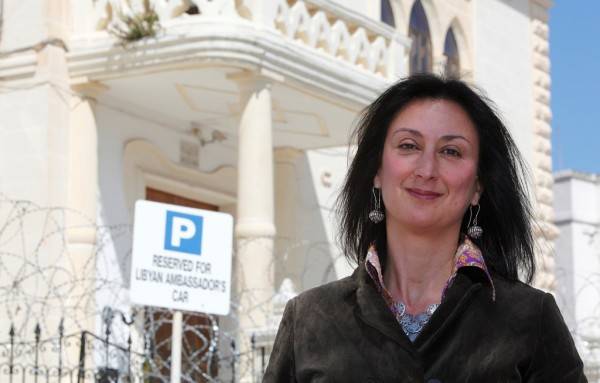Journalist's murder turns spotlight on 'mafia island' Malta
Shares

Valletta: The son of murdered Maltese journalist Daphne Caruana Galizia on Tuesday accused Prime Minister Joseph Muscat of being complicit in his mother's death as the shockwaves from a grisly car bomb killing reverberated across Europe.
Matthew Caruana Galizia, also an investigative journalist, described the pain of finding his mother's body blown to pieces and said he believed she had been assassinated for her whistleblowing activity.
In an emotional post on his Facebook page, the son accused Muscat of filling his office with crooks and creating a culture of impunity that had turned Malta into a "mafia island".
The centre-left premier denies any wrongdoing. But the case looks set to increase scrutiny of Malta by its partners in the European Union.
Some members of the bloc have already expressed concern over the island's light-touch regulation of financial services and company registrations, and a controversial scheme that offers an EU passport to wealthy investors.
The European Commission said it was horrified by what it termed a likely "targeted attack".
"This is a horrible event, a major thing that needs to be investigated, and clarified," commission spokesman Margaritis Schinas said.
Press freedom group Reporters without Borders described the murder as being like something out of Vladimir Putin's Russia and a rare incident of its kind for an EU state.
Caruana Galizia, a veteran journalist who had been called a "one-woman Wikileaks", had lately used her widely read blog to make a series of detailed allegations of corruption in Muscat's inner circle, some based on the Panama Papers data leak.
Her killing has triggered grief and anger on the island of 430,000 people, with thousands attending an overnight vigil that was followed Tuesday with a "Justice for Daphne" demonstration outside the main law courts in the fortress capital Valletta.
"The state did not defend Daphne," said Andrew Borg Cardona, a prominent lawyer who works with the journalist's husband.
Michael Briguglio, a former leader of the island's Greens party, said: "This is a political murder because it clearly has a political context and the state did not protect a journalist who was in danger.
Office filled with crooks:"I am never going to forget, running around the inferno in the field, trying to figure out a way to open the door, the horn of the car still blaring, screaming at two policemen who turned up with a single fire extinguisher to use it," Matthew Caruana wrote on Facebook.
"They stared at me. 'I'm sorry, there is nothing we can do", one of them said. "I looked down and there were my mother's body parts all around me. I realised they were right, it was hopeless."
Muscat has described the killing as "barbaric" and vowed to bring the perpetrators to justice with the help of FBI investigators.
That pledge from the Labour Party prime minister was dismissed by the victim's son.
"It is of little comfort for the prime minister of this country to say that he will 'not rest' until the perpetrators are found, when he heads a government that encouraged that same impunity," he wrote.
"First he filled his office with crooks, then he filled the police with crooks and imbeciles, then he filled the courts with crooks and incompetents." Aides' secret accounts:
The judge in charge of investigating the murder stepped aside from the case Tuesday following objections from the Caruana Galizia family.
Magistrate Consuelo Scerri Herrera had been accused of misconduct by the blogger and had threatened her with libel proceedings.
Caruana Galizia's death came four months after Muscat won a landslide victory in elections that were called early after she accused his wife of taking kickbacks from Azerbaijan's ruling family and hiding the cash in a secret Panama bank account.
The claims, which Muscat denies, were the latest in a string of scandals based on information leaked from the records of the Panama law firm Mossack Fonseca.
The so-called Panama Papers revealed how wealthy individuals around the world, including several lawmakers, used shell companies in tax havens to hide cash. Keith Schembri, Muscat's chief of staff, and Konrad Mizzi, a government minister, were both forced to admit having undeclared accounts. But the premier resisted pressure to dismiss them, insisting they had done nothing illegal.
